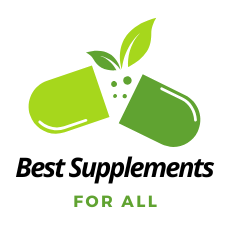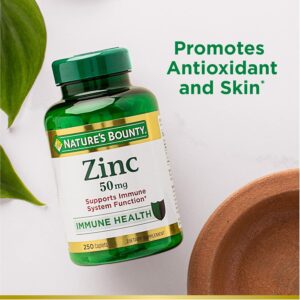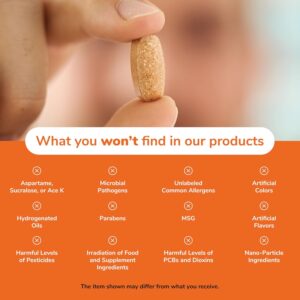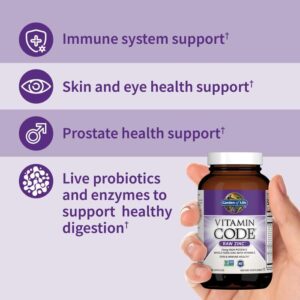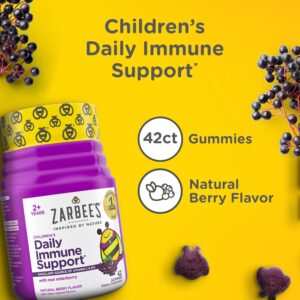*This post may contain affiliate links, meaning we may earn a commission at no extra cost to you based on honest recommendations.*
When you think about supporting your immune system, vitamins like C or D might be the first things that pop into your mind. But there’s one powerful mineral that doesn’t get as much of the spotlight—and that’s zinc. You may have heard of zinc being used in throat lozenges or cold medicines, but its benefits go far beyond that. Zinc is like a bodyguard for your immune system, keeping you strong, helping your body fight off sickness, and assisting in a range of bodily processes that keep you feeling your best.
Let’s explore what makes zinc so effective, and how you can benefit from including more zinc in your daily life.

What is Zinc and Why Does It Matter?
Zinc is an essential trace element, meaning your body needs it in small amounts, but it plays a massive role in maintaining your health. It’s a critical part of cell production, enzyme function, and immune system performance. You might not realize it, but zinc is involved in hundreds of chemical reactions in your body. These processes help repair tissues, maintain skin health, and keep your immune system running optimally.
Your body doesn’t store zinc naturally, so you need to make sure you’re getting enough through your diet or supplements. Without enough zinc, your immune system can be compromised, making you more susceptible to illnesses and infections. The mineral is a true multitasker, helping to regulate inflammation, create immune cells, and even improve wound healing.
Zinc and Your Immune System: A Powerful Team
Your immune system is your defense against everything from the common cold to more serious infections. Zinc plays a crucial role in helping your immune system function optimally. When you get sick, your immune system calls on white blood cells to fight off invaders like bacteria and viruses. Zinc supports the production and function of these immune cells, giving your body what it needs to fight back effectively.
1. Zinc Helps Produce White Blood Cells
White blood cells are the main line of defense for your body, like soldiers defending against invaders. Without enough zinc, your body can’t produce these cells as effectively. When you have adequate zinc levels, your body can create more T-cells (a type of white blood cell), which are responsible for recognizing and destroying harmful pathogens.
2. Zinc and Shorter Duration of Colds
Have you ever heard of using zinc lozenges to shorten the duration of a cold? It’s not just a myth—zinc has actually been shown to help reduce the length and severity of the common cold when taken early on. The reason is that zinc interferes with the ability of rhinoviruses (the viruses responsible for most colds) to multiply. So, when you start to feel those first symptoms, using zinc can help cut down on the time you feel unwell.
Other Health Benefits of Zinc
While zinc is most commonly recognized for its immune-boosting powers, it offers several other health benefits that are worth noting.
1. Wound Healing
Zinc is often used in ointments to treat cuts and wounds because it plays a vital role in collagen synthesis and immune function. If you have a wound that’s taking a long time to heal, a lack of zinc might be the culprit. Zinc helps cells regenerate and repair more quickly, ensuring that your wounds heal properly.
2. Anti-Inflammatory Properties
Zinc also has powerful anti-inflammatory effects, which can be helpful for reducing symptoms of chronic illnesses like arthritis. Inflammation is part of your body’s immune response, but if it’s left unchecked, it can do more harm than good. Adequate zinc levels can help moderate your body’s inflammatory response, reducing the risk of long-term damage.
3. Supports Growth and Development
For children, zinc is especially important for proper growth and development. Without enough zinc, growth can be stunted, and cognitive development may suffer. This is why making sure your kids get enough zinc in their diet is critical.
Food Sources of Zinc
Now that you understand why zinc is so important, how do you make sure you’re getting enough? The good news is that zinc is present in a variety of everyday foods. Some great sources of zinc include:
- Shellfish: Oysters are particularly rich in zinc, offering more zinc per serving than any other food.
- Red Meat and Poultry: Beef, pork, and chicken are great sources.
- Legumes: Chickpeas, lentils, and beans are rich in zinc, though the zinc from plant-based sources isn’t absorbed as easily by your body.
- Nuts and Seeds: Pumpkin seeds, sesame seeds, and cashews are good options for plant-based zinc.
- Dairy Products: Milk and cheese can also contribute to your daily zinc intake.
However, depending on your diet, you may find it difficult to get enough zinc through food alone, especially if you are vegan or vegetarian. In these cases, a supplement might be a good idea.
Should You Take a Zinc Supplement?
If you’re not getting enough zinc from food sources, you might want to consider taking a supplement. Zinc supplements are widely available, and they come in various forms, including tablets, capsules, and lozenges.
Popular Products for Immune Support
If you’re considering a supplement, it’s important to pick one that’s high-quality. Here are some highly rated zinc products available on Amazon that many people have found helpful:
- Nature’s Bounty Zinc 50mg Tablets: This is a simple, effective, and affordable option for adding zinc to your daily regimen. It’s highly rated, with thousands of positive reviews attesting to its immune-supporting benefits.
2. Zinc Picolinate by NOW Foods: Zinc Picolinate is one of the more easily absorbed forms of zinc. Many users find this product to be gentle on the stomach, making it a good option if you have had trouble with zinc supplements in the past.
3. Garden of Life Vitamin C Raw Zinc: This product offers 30mg of zinc along with vitamin C to further support immune health. It’s also vegan-friendly, non-GMO, and has added probiotics to help with digestion.
How Much Zinc Should You Take?
The recommended daily intake of zinc can vary depending on your age, gender, and life stage. For adults, the recommended amount is generally around 8-11mg per day. If you’re pregnant, breastfeeding, or dealing with an illness, you may require more. However, more isn’t always better—taking too much zinc can lead to negative effects like nausea, headaches, and even immune suppression. Most supplements provide between 15-50mg per dose, so you’ll want to be sure to stay within recommended guidelines.
It’s always a good idea to consult with a healthcare professional before starting any supplement, especially if you have any pre-existing conditions or are taking other medications.
Tips for Getting the Most Out of Zinc
- Take Zinc With Food
To avoid stomach upset, it’s best to take zinc with food. This will also help your body absorb it more effectively.
- Pair with Vitamin C
Zinc and vitamin C are like partners in crime when it comes to immune support. You’ll often find them together in lozenges and supplements, and for good reason—they work synergistically to boost immune function. Consider a product that includes both, like Emergen-C Immune+ with Zinc, which is another Amazon favorite.
- Avoid Taking Zinc with Iron or Calcium
Calcium and iron can interfere with zinc absorption, so if you’re taking a multivitamin or other supplements, try to space them out to get the most benefit. For example, if you take an iron supplement in the morning, consider taking zinc later in the day.
Zinc for Specific Populations
1. Zinc for Children
Zinc is important for kids too, especially for growth and immune development. If you have picky eaters in the house, you might find it challenging to make sure they’re getting enough zinc. There are kid-friendly zinc supplements available, like Zarbee’s Naturals Children’s Elderberry Immune Support Gummies, which provide a good dose of zinc along with elderberry and vitamin C for extra immune power.
2. Zinc for Seniors
As we age, our immune system naturally weakens, which makes zinc even more critical for older adults. Zinc helps seniors maintain a strong immune system and avoid prolonged illnesses. Supplements like Carlyle Zinc 50mg are a popular choice among older adults looking for extra immune support.
3. Zinc for Vegetarians and Vegans
If you’re on a plant-based diet, you might be at higher risk for zinc deficiency since the zinc found in plant-based foods isn’t absorbed as efficiently by the body. Supplementing with zinc is a great way to ensure you’re getting enough, and products like Garden of Life Vitamin C Raw Zinc are perfect because they’re vegan-friendly and derived from whole foods.
Potential Side Effects of Zinc
While zinc is generally safe for most people, there are a few potential side effects to be aware of:
- Stomach Upset: High doses of zinc can cause nausea or other gastrointestinal issues. To avoid this, make sure to take zinc with food.
- Interference with Other Minerals: Zinc can interfere with the absorption of other essential minerals like copper. Some people take a copper supplement along with zinc to keep things balanced, but it’s best to speak with a healthcare professional about this.
- Risk of Overuse: Taking more than 40mg of zinc per day over a long period can cause issues such as reduced immune function and imbalances with other minerals. Always stick to recommended doses unless otherwise directed by a healthcare provider.
Incorporating Zinc into Your Daily Life
Adding zinc to your routine doesn’t have to be complicated. You can make sure to include zinc-rich foods at each meal, like adding nuts and seeds to your breakfast or enjoying shellfish for dinner. If you’re considering supplements, there are many great products available that can make a big difference, especially during cold and flu season when your immune system needs a little extra help.
When you start to feel run down or when you know you’re going to be in a situation where you’re exposed to more germs (like traveling or during the winter months), a zinc supplement can provide that extra line of defense you need. Look for lozenges, tablets, or immune-support products that suit your lifestyle.
The Bottom Line
Zinc is an underrated yet crucial mineral for immune health, playing a key role in producing white blood cells, reducing inflammation, and promoting proper healing. By making sure you’re getting enough zinc, either through a diet that includes zinc-rich foods or by taking a high-quality supplement, you can give your immune system the boost it needs to keep you feeling healthy and strong.
Next time you feel a cold coming on, consider zinc as part of your game plan. Whether through lozenges, tablets, or natural food sources, zinc is one of the best ways you can actively support your immune health.
Would you like me to provide some easy recipes that are rich in zinc or offer more suggestions on zinc supplements? Let me know how I can help further!
